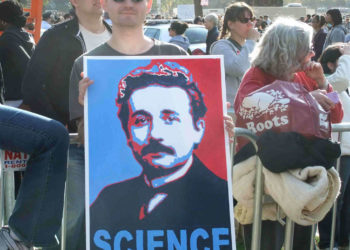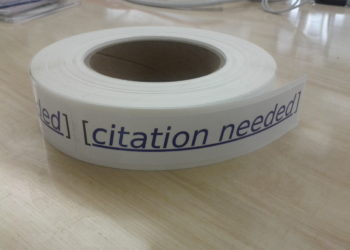In the six or so years since it started, FORCE11 has become, as its name suggests, a major force in the scholarly communications world. Described variously as “a place to put our prejudices aside and make progress” (Phil Bourne), “Providing cover for what people wanted to do anyway…make a home for these efforts to grow” (Daniel O’Donnell), and “a catalytic event” (Tim Clark), it’s come a long way since its launch in (of course) 2011. In this interview, Cameron Neylon, FORCE11’s President, tells us about its history, achievements to date, challenges, and future goals, as well as its latest venture, the FORCE11 Scholarly Communications Institute, which launches this summer.

How did FORCE11 come to be? Why was it needed and who was involved in launching it?
FORCE11 grew out of two independent meetings in 2011. One was organized by Phil Bourne in San Diego and the other by Anita de Waard, Tim Clark, Ed Hovy and Ivan Herman as a Dagstuhl Workshop in Germany. Both were motivated by desire to accelerate change in scholarly communications. Both meetings brought together an unusual mix of technologists, researchers, librarians, funders and publishers. Anita’s workshop was called the “Future of Research Communication”, but it is David Shotton who gets the credit for adding on “and E-scholarship” to give us the FORCE name.
What came out of those meetings was a community that wanted to get things done. This is perhaps best expressed in the FORCE11 Manifesto, a vision of what could be. There was a shared sense of excitement about what was possible, a sense that we had some part of a shared vision, but also a very strong desire to work on practical things that could lead to change. What’s been consistent all along is that FORCE11 brings together a wide range of people around common goals. That kind of forum had formerly been missing; meetings were either focused around specific groups — publishers meeting with publishers, librarians with librarians — or around specific disciplines.
The organizers and founders of the original meetings keep coming back to the idea of a “catalytic event” or a “crystallization” of action from a super-saturated solution. For me that really captures something important. FORCE11 started as a group that was super-well connected and brought groups of people together who had common problems, and the will to work together to solve them. Early on we were focused on the problems themselves, but over time we came to realize that it was bringing people together in an environment where they can find what it is they have in common, even when they more commonly disagree, and how we can work together to solve common problems and grasp common opportunities.
What were the organization’s original goals and have they been achieved?
Phil’s initial meeting was called “Beyond the PDF” which gives you an idea of the goal — making change happen. The Manifesto takes the same stance. And alongside that it was also a really exciting group of people who were making change happen around them. What grew out of those early meetings was the realization that real targeted progress got made when a group of people came together around a shared understanding of a problem.
A great example of that is the Joint Declaration of Data Citation Principles. This started life as a Birds of a Feather session at the “Beyond the PDF2” meeting in Amsterdam in 2013. That group set down some principles but then brought together a much wider group to discuss and refine the principles that were then agreed and published in 2014. From then a group has continued to lead the implementation process, bringing in contributors from publishers and data repositories to work the challenges and build solutions that are now being implemented but the community.
What were the main challenges for FORCE11 initially?
The first challenge was that change is hard, so with the ambitious agenda of the Manifesto there were many different things to explore. I think the second was figuring out what the place for FORCE11 was. There are lots of organizations working on different aspects of scholarly communication, so what does FORCE11 add? That evolved organically as some efforts worked and some did not succeed.
There’s more work to do but our aspiration is to be able to support a global conversation on how we change scholarly communication for the better — without necessarily assuming that we already have the answers.
And what do you consider to be the organization’s greatest achievements so far?
FORCE11 prides itself not only on being the incubator for new ideas but for having a tested and proven multi-stage process for bringing these ideas from principle to widespread adoption, with an impressive success record. Some of the projects that have followed this path are the Joint Declaration of Data Citation Principles, Software Citation Principles, FAIR Data Principles and the Research Resource Identifiers (RRID’s).
The Scholarly Commons Working Group is tackling really challenging problems of what a truly equitable and inclusive space for scholarly work and communication would look like. This is both at the practical “how-to” level as well as the really knotty issues of theory and politics that these questions raise.
The conferences have developed into a major meeting place and we see them as the venue in which we encourage new ideas and issues to bubble up, for people to find others facing the same issues. There are many conferences for people to go to and the steady growth of the FORCE series shows that it’s offering something unique. And we hope to follow on with that with the new Scholarly Communications Institute.
So what exactly is the FORCE11 Scholarly Communications Institute?
The first thing is that FSCI is NOT a conference; it is a week-long summer training program being held July 31-August 4 at the University of California, San Diego. When we met for FORCE2016 in Portland there were a series of discussions about different needs for training. If our other meetings bring together a diverse group of people with common interests, we wondered whether the same kind of diversity of experience with common needs applied to training and education. It seemed like many people come fresh to scholarly communications, as publishers, funders, librarians, and researchers but also technologists and senior administrators. They get a view from a particular perspective, but what if they could get the information they need while learning with people coming from many different places?
We used the highly successful Digital Humanities Summer Institute as a model. We called for community contributed courses and were overwhelmed with great suggestions and offers. We’ve selected a total of 28 courses and participants will be able to choose one long “Morning Course” (five sessions, running in the morning) and two “Afternoon Electives”. The courses cover everything from history of scholarly publishing to peer review, state of the art technology, research evaluation and developing standards, for participants whose experience ranges from beginner to expert. As with all things FORCE11, we want this to be as much a community-building process as an event that happens each year. And registration has just opened!
There is perhaps more polarization than ever on some of the main debates in scholarly communications. Finding areas where consensus is possible and supporting productive conversations between groups with different needs and agendas is a challenge.
Now that it’s more established, have FORCE11’s goals and/or stakeholders changed at all?
I think two things have changed over the past few years. Firstly the organization is focused more on supporting different communities to come together and work on the changes that they want in scholarly communication, rather than being exclusively focused on the specific changes that were in the Manifesto.
Alongside this there’s been a very conscious effort to include broader communities. Early on we wanted to ensure we included humanities and social scientists, but we also want to expand the geographical inclusion of those involved to build a global conversation. We are very proud of the geographical diversity of participants in our meetings, something that has been achieved with generous support from a range of sources. There’s more work to do but our aspiration is to be able to support a global conversation on how we change scholarly communication for the better — without necessarily assuming that we already have the answers.
The FORCE11 Scholarly Communications Institute is a big part of that. The idea that we all have as much to learn from each other, as we have to offer in terms of ideas and technology.
Where do you want the organization to be in 3-5 years time?
Like any small organization that’s relatively new, our first issue is sustainability. Not just financial sustainability – although that’s critical, and a big part of our day to day work – but also from a governance and social perspective. In 3-5 years I’d like to see FORCE11 being a focus and a platform that brings a wider group of people together and that is the natural place to start conversations across stakeholder groups in scholarly communications. We’ve been very effective at bringing groups together, including for some difficult conversations. If we can offer a place that is neutral and supportive where groups with differing agendas can seek to find common ground on how to move forward I’ll be happy.
What are the main obstacles to getting there?
Well money is as always a key issue. We’re an incredibly lean organization, roughly 1FTE of paid staff – who do an amazing amount of work – so we need to choose where to focus the available effort. How do we find the balance between institutional memory and getting fresh perspectives from the community. How can we support the crucial role that our very (very!) lean and effective staff team play and give them the stability that they need while being an agile and responsive organization?
Another challenge is the role we’ve taken on. Seeing ourselves as a platform that supports communities means that FORCE11 itself is sometimes less visible. We see the outputs that we support as belonging to the communities that create and implement them, not as the property of FORCE11. I believe strongly that’s been a part of the success but it can also be a challenge.
Finally there are community and political challenges. There is perhaps more polarization than ever on some of the main debates in scholarly communications. Finding areas where consensus is possible and supporting productive conversations between groups with different needs and agendas is a challenge. And like everyone in scholarship the broader political environment, both in terms of travel and funding affects us as well.
How can scholarly publishing organizations and individuals get involved?
The best place to get involved is at our meetings or within Working Groups and projects. As we’ve said, the first FORCE11 Scholarly Communications Institute will be held at UCSD 31 July – 4 August. This is an exciting program which should be of interest to all Scholarly Kitchen readers. Our main conference, FORCE17 will be in Berlin 25-27 October this year and the call for program contributions will be out shortly.
Finally, what three words best sum up FORCE11 for you?
Are we allowed three phrases? 1. Convening the right group 2. Finding consensus for the right action 3. Supporting the right implementation plans. If it has to be just three words, then I guess they would be: convening (for) positive action.
Discussion
6 Thoughts on "Feel the FORCE(11): An Interview with Cameron Neylon"
What are the source(s) of FORCE11 funding?
It’s been a mix. In-kind support and grants have been a substantial contributor and sponsorship and donations, from both universities and corporates, made up most of the rest for the first few years. More recently we achieved a surplus for the past two conferences and in the longer term the aim is for the Institute to get to break even and then a modest surplus. We recently also put in place a (optional) system for individual contributing members which is raising a modest amount. The goal is for recurrent core costs to be funded out of recurring revenue and grant income be dedicated to projects (we are eligible for overheads from some funders as well).
Bottom line its mostly a mix of relatively small contributions. The biggest single amounts have been project grants which are tied to specific projects. The set-up of the institute is being supported by a substantial in-kind contribution from UCSD.
Cameron, can you give us an example of how FORCE11 has succssfully provided a neutral and supportive place in which groups with differing agendas have found common ground? How much agenda diversity do you see within the group?
Something that might fit your bill would be the Data Citation Principles, which has been an area where a broad group of stakeholders has come together to set standards and guidelines. There are a lot of different agendae behind moves to open up research data, but all involved need their systems to speak the same language. I know that I’ve found them extremely useful in helping our journals implement open data policies.
To echo David, I think the Data Citation Principles are the most mature example. In particular they arose, first from a group (who might reasonably be described as “usual suspects”) getting together and writing a draft. It’s the step after this, actively seeking out input from a wide range of organisations who had different needs and agendas and seeking a consensus that is the strength behind the principles as they were finally published.
Of course, its fair to say that there was a shared interest here, and I definitely think diversity of agenda and background is something that is a work in progress. My view is that we’ve tried to create opportunities where people come together and let things bubble up. Obviously though the people we’ve brought together are biased in a range of ways, Anglophone, broadly North Atlantic, interested in technology, arguably still with a STEM slant. So we’ve been working on these bit by bit.
The best example of this is the developing work of the Scholarly Commons Working Group. This group has had an active focus on diversity in a range of forms. And there have been some tough moments as a result of the (improving, modest) success in that area. From radically different perspectives coming from the humanities and sciences about what approaches are appropriate in facilitating a workshop through to criticism from under represented minorities and global south participants about the assumptions that are being made by established western participants. Here I can’t point to a complete resolution – there’s a lot of work to do – but an ongoing effort to apply the lessons from the Data Citation Principles.
For me the key lies in trying to work systemically to increase the diversity of participants, and then trying to support the identification and resolution of issues that are found in common. It’s not about being the UN for scholcomms or achieving world peace, but the much more modest goal of finding where differing groups have a common problem they can work together to solve. That and I think we have a good process that has evolved – draft principles, seeking consensus, move onto implementation planning, support the community to implement – which seems to work well for that goal.
Good answers, thanks!


